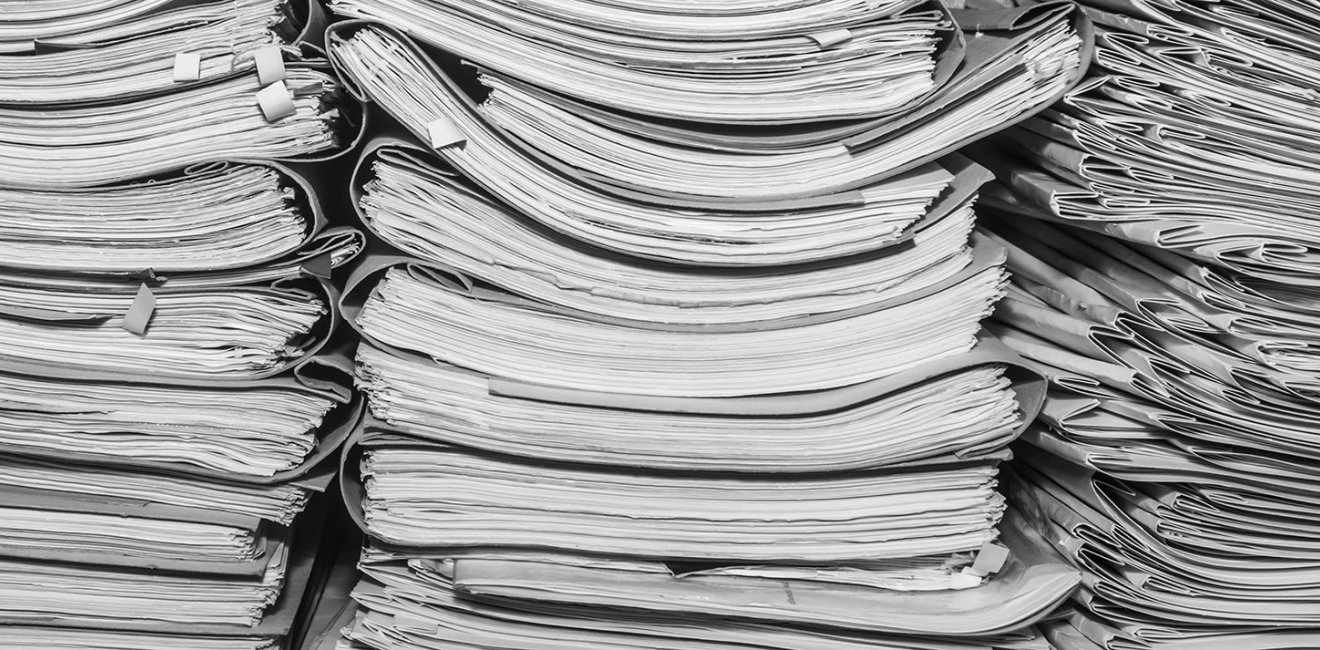A Survey of Middle East Archives: Lebanon
A brief survey of the diplomatic archives and research institutions in Lebanon - part one of a five-part series.

A blog of the History and Public Policy Program
A brief survey of the diplomatic archives and research institutions in Lebanon - part one of a five-part series.

After twenty years of civil war and enduring numerous conflicts since, the archival situation in Lebanon is, understandably, best described as decentralized. Though it is only rarely used by historians working in Lebanon, there is a National Archives (also known as the Centre des Archives Nationales) in Beirut in the neighborhood of Hamra. The National Archives is the repository for Lebanon’s various government ministries. However, because there is no declassification law in Lebanon, it is difficult to ascertain exactly what files the National Archives possesses. There is a website for the Archives, but as of the writing of this article, the website has not been updated since 2015 and the most recent catalog of its holdings was published in the 1980s.
If you are intent on making a visit to the National Archives, it is open to the public Monday through Friday during normal business hours. Researchers must present a passport and complete an application, in Arabic, listing their topic of study, affiliation, and basic personal information. The application then must receive approval from the General Director of the Archives. Once you have received approval, you will need to speak to the archivists, who will retrieve documents relating to your stated project. The archivists are knowledgeable but are reported to have essentially absolute power within the building, and reserve the right to refuse any request. If a request is not refused outright, it may often be met with the claim that the files you are looking for were destroyed during the civil war. This may or may not be true, but what is certain is the archivists are the gatekeepers, and a positive relationship with them is necessary for any productive work to be done there.
It is also important to note that the majority of government files within the National Archives are not from the ministries tied to diplomacy, but primarily the ministries of agriculture, health, education and planning. This further limits its usefulness to scholars of diplomatic history. Each ministry, including foreign affairs and defense, has its own archives which are closed to the public and do not have accessible catalogs.
Without a comprehensive state archive, researchers must instead turn to private institutions, libraries, and universities. This means each researcher will need to determine for herself where the materials relevant to their own project will be. There have been books published in Arabic on the development of archives in Lebanon, but the best starting place for researchers trying to determine the lay of the land is the 2003 article by Sara Scalenghe and Nadya Sbaiti in the Middle East Studies Association Bulletin, “Conducting Research in Lebanon.”[1] The two-part article outlines a number of the key universities and institutions in Beirut and in the rest of the country, with very helpful information on who to contact and what holdings are within each archive. While some of the names and emails listed are sure to be out of date by now, it is a very useful starting point.
Because there are too many different subjects researchers could be interested in and too many corresponding institutions to list in this article, I will instead focus on the major institutions that are in a position to assist researchers in Lebanon as well as a few key archives that one should be aware of.
For Western researchers, particularly from the United States, the American University of Beirut (AUB) is the clear first point of contact. The historians and librarians at AUB are well-informed on the archives of Lebanon and are very welcoming to visiting researchers in need of advice. The university also has its own archive, much of which is made up of newspapers and collections relating to its own history, as well as the personal papers and other donated materials of some influential Lebanese figures. There is also a special collections section (ASC), which has a website and is accessible for a small daily fee. Some collections that might be of interest include the AUB Students’ Activism Collection: 1970-1979, the CAMES Oral History Collection, and the Political Poster Collection. Access to AUB’s holdings are clearly stated on the website and are governed by US republication laws. The AUB library’s main number is +961 1 340460 / 350000 Ext. 2600/2601 and email is library@aub.edu.lb; to reach the Archives and Special Collections department, you can dial extension 2609/10 or email asc@aub.edu.lb.
While AUB has often been the starting point for visiting historians, there are a number of universities that have made tremendous strides in recent years and should be considered valuable potential resources. The Holy Spirit University of Kaslik (USEK) is one of these. USEK’s recent rise in the Lebanese scholarly world is due largely to its massive digitization project. While USEK is not in as central a location as AUB – it is based in Mount Lebanon north of Beirut – its unique Digital Development Center makes it worth the effort to visit. The library’s own holdings primarily focus on USEK’s history and the history of the Maronite community (USEK is a Jesuit university), but the digitization project has received a number of collections from the National Museum and features several personal collections that should be noted, including those of Fouad Chehab, Camille Chamoun, and Bachir Gemayel. Most collections are not available online, however, and need to be accessed in person at the university. Applications for one- or multiple-day memberships are done online through the university’s websites, with costs ranging from ~$3 USD for one day up to $100 USD for one year.
Another university worth noting is the Lebanese American University. Formerly Beirut’s Women’s College, it is home to a number of Lebanon’s top historians and is a highly regarded university in its own right. Reflecting its origins, it has a strong collection of materials on women’s studies including many valuable sources on women’s political activism. Lebanese University, Lebanon’s only public institution of higher learning, has a good number of books and magazines from the Cold War period, and could be a valuable resource for researchers based in Beirut. Finally, the Bibliotheque Orientale of Université Saint-Joseph and the University of Balamand might be of interest for those working on Islamic and Greek Orthodox studies, respectively. The Université Saint-Joseph also houses publications from different political parties and most of its holdings are in French, not Arabic, which may make it easier on many Western visitors.
The next step for researchers to consider is finding private institutions relevant to their project. Though there is no single institution that houses documents related to all of Lebanon, there are a number of different private ones that have holdings related to different groups, religions, or political parties. Umam Documentation and Research is a non-governmental organization founded in 2005 to preserve the memories and lessons from Lebanon’s brutal civil war. UMAM D&R has a vast collection of books, newspapers, leaflets, posters, videos and magazines related to the civil war, which are openly available to the public. There are some materials available online, but the best way to review the collection is to visit the offices in Dahra, Beirut. Researchers can set appointments by email through the website or contacting info@umam-dr.org. Similarly, the Institute for Palestine Studies (IPS) is a non-profit focused on the documentation of Palestinian affairs. IPS has offices in north-west Beirut as well as one in Washington, DC, offering a far more convenient access point for those based in the US. They also carry most of, if not all publications by the Palestinian Liberation Organization available in English.
For researchers interested in the political parties of Lebanon, there are several private archives that have holdings for the Progressive Socialist Party and the Kataeb Party, which represent the Druze and Maronite Christians, respectively. The official archive of the Progressive Socialist Party is Dar al-Taqadumiyya and is located in Muqtara, Mount Lebanon. It houses all books, pictures, donations, and newspapers of the party, all in Arabic. There is no website for the archive, making it difficult to reach without first consulting other scholars based in Lebanon, highlighting the importance of first getting in contact with universities or other research institutions. For archives on the Druze in general, one should look to the Shuf (or Chouf), the mountainous district to the south-east of Beirut and home to much of the Druze community. There, researchers may visit the towns of Biq’ata, Ba’aqline, and ‘Abey, each of which houses repositories of historical sources regarding aspects of Druze history. The ‘Irfan School (Biq’ata), al-Maktaba al-Wataniyya, also known as Baakline Library (Ba’aqline) – a branch of the National Library, and the Library of Bayt al-Yatim (‘Abey) contain a variety of maps, manuscripts, periodicals and other secondary sources for researchers to investigate.
The Maronite-Christian Kataeb Party, also known as the Phalanges Party, a key player in the Lebanese civil war, whose militia did much of the fighting for the Christian coalition, has a museum in Haret Sakher, Jounieh, though it is highly politicized in its message and holdings. For a broader history of the Maronite community, the Maronite Patriarchate Library in Bkerke may be a better alternative. However, gaining access to the library can be difficult. Researchers are expected to provide detailed outlines of their projects as well as letters of recommendation, which are submitted to the Patriarch. While the library holds both documents and manuscripts, there is a 75-year moratorium on access to archival material, so researchers working on modern Lebanon may not find much available.
There are, of course, many other political parties, communities, and subjects within Lebanon that deserve mention, but it would be impossible to list them all here. Instead, it is recommended to reach out to the universities or research institutions listed above, whose staff will be better positioned to provide more specific direction.
[1] Scalenghe, S and Sbaiti, N 2003, ‘Conducting Research in Lebanon: An Overview of Historical Sources in Beirut (Part I), MESA Bulletin 37/1, pp. 68-79; Scalenghe, S and Sbaiti, N 2004, ‘Conducting Research in Lebanon: An Overview of Historical Sources Outside of Beirut (Part II), MESA Bulletin 38/2, pp. 187-195.


A leader in making key foreign policy records accessible and fostering informed scholarship, analysis, and discussion on international affairs, past and present. Read more


The Cold War International History Project supports the full and prompt release of historical materials by governments on all sides of the Cold War. Read more



